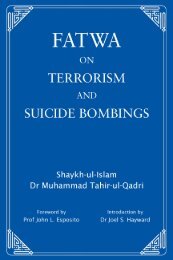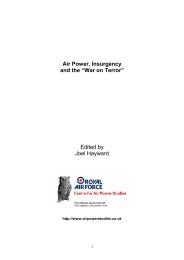Air Power, Insurgency and the âWar on Terrorâ - Prof. Joel Hayward's ...
Air Power, Insurgency and the âWar on Terrorâ - Prof. Joel Hayward's ...
Air Power, Insurgency and the âWar on Terrorâ - Prof. Joel Hayward's ...
Create successful ePaper yourself
Turn your PDF publications into a flip-book with our unique Google optimized e-Paper software.
Royal <str<strong>on</strong>g>Air</str<strong>on</strong>g> Force Operati<strong>on</strong>s in South-West Arabia 1917-1967<br />
An even more substantial offensive in <str<strong>on</strong>g>the</str<strong>on</strong>g> Radfan was planned for April 1964; <strong>on</strong>e that<br />
would end rebel activity in <str<strong>on</strong>g>the</str<strong>on</strong>g> area. The attack got off to a poor start when an advance<br />
party from <str<strong>on</strong>g>the</str<strong>on</strong>g> SAS was discovered by <str<strong>on</strong>g>the</str<strong>on</strong>g> rebels <str<strong>on</strong>g>and</str<strong>on</strong>g> needed very close air support<br />
until <str<strong>on</strong>g>the</str<strong>on</strong>g>y could be safely withdrawn. The planned parachute acti<strong>on</strong> was cancelled <str<strong>on</strong>g>and</str<strong>on</strong>g><br />
<str<strong>on</strong>g>the</str<strong>on</strong>g> ground forces advanced using <str<strong>on</strong>g>the</str<strong>on</strong>g> cover of darkness. The fighting, often intensive,<br />
c<strong>on</strong>tinued for <str<strong>on</strong>g>the</str<strong>on</strong>g> next six weeks, supported by RAF fixed wing <str<strong>on</strong>g>and</str<strong>on</strong>g> helicopters from all<br />
three Services. <str<strong>on</strong>g>Air</str<strong>on</strong>g> c<strong>on</strong>trol of <str<strong>on</strong>g>the</str<strong>on</strong>g> dissident areas c<strong>on</strong>tinued after <str<strong>on</strong>g>the</str<strong>on</strong>g> ground fighting had<br />
c<strong>on</strong>tinued until November when all <str<strong>on</strong>g>the</str<strong>on</strong>g> tribes involved had sued for peace. Radfan was a<br />
military success, but it proved a political failure that presaged eventual withdrawal.<br />
At <str<strong>on</strong>g>the</str<strong>on</strong>g> beginning of 1966 <str<strong>on</strong>g>the</str<strong>on</strong>g> Government issued a White Paper stating its intenti<strong>on</strong> to<br />
withdraw British forces from South Arabia in 1968. This marked <str<strong>on</strong>g>the</str<strong>on</strong>g> beginning of <str<strong>on</strong>g>the</str<strong>on</strong>g><br />
end. C<strong>on</strong>fidence in <str<strong>on</strong>g>the</str<strong>on</strong>g> future of <str<strong>on</strong>g>the</str<strong>on</strong>g> Federati<strong>on</strong> rapidly fell while <str<strong>on</strong>g>the</str<strong>on</strong>g> security situati<strong>on</strong><br />
quickly worsened. This included fur<str<strong>on</strong>g>the</str<strong>on</strong>g>r cross-border incursi<strong>on</strong>s, involving fighter aircraft<br />
based in Yemen, <str<strong>on</strong>g>and</str<strong>on</strong>g> ever higher levels of terrorism. In <str<strong>on</strong>g>the</str<strong>on</strong>g> event, matters got so bad that<br />
departure was brought forward to November 1967. It is to <str<strong>on</strong>g>the</str<strong>on</strong>g> RAF’s immense credit that<br />
<str<strong>on</strong>g>the</str<strong>on</strong>g> evacuati<strong>on</strong> of families, equipment <str<strong>on</strong>g>and</str<strong>on</strong>g> pers<strong>on</strong>nel was completed <strong>on</strong> time <str<strong>on</strong>g>and</str<strong>on</strong>g> with <str<strong>on</strong>g>the</str<strong>on</strong>g><br />
minimum of fuss. Yet it was an unhappy period <str<strong>on</strong>g>and</str<strong>on</strong>g> brought to an end not <strong>on</strong>ly 128 years<br />
of British rule but also nearly fifty years of RAF operati<strong>on</strong>s at Khormaksar.<br />
C<strong>on</strong>clusi<strong>on</strong>s<br />
Looking back at <str<strong>on</strong>g>the</str<strong>on</strong>g> history of air operati<strong>on</strong>s in South-west Arabia, it is clear that air<br />
c<strong>on</strong>trol, as an instrument of governance, was <strong>on</strong>ly effective (<str<strong>on</strong>g>and</str<strong>on</strong>g> <strong>on</strong>ly intended) as an<br />
extensi<strong>on</strong> of col<strong>on</strong>ial authority. This required <str<strong>on</strong>g>the</str<strong>on</strong>g> indigenous populati<strong>on</strong>, or at least its<br />
leaders, to recognise <str<strong>on</strong>g>the</str<strong>on</strong>g> legitimacy of British rule. Critics have made much of <str<strong>on</strong>g>the</str<strong>on</strong>g> failure<br />
of <str<strong>on</strong>g>the</str<strong>on</strong>g> RAF to c<strong>on</strong>trol Palestine in <str<strong>on</strong>g>the</str<strong>on</strong>g> 1920s, noting that aircraft proved incapable of<br />
pacifying <str<strong>on</strong>g>the</str<strong>on</strong>g> towns <str<strong>on</strong>g>and</str<strong>on</strong>g> cities. This is to miss <str<strong>on</strong>g>the</str<strong>on</strong>g> point: air c<strong>on</strong>trol could <strong>on</strong>ly be effective<br />
if <str<strong>on</strong>g>the</str<strong>on</strong>g>re was a credible basis for governance. Where this existed, <str<strong>on</strong>g>the</str<strong>on</strong>g> RAF was able to<br />
extend <str<strong>on</strong>g>the</str<strong>on</strong>g> authorities’ reach to those areas that were o<str<strong>on</strong>g>the</str<strong>on</strong>g>rwise inaccessible or just too<br />
expensive to garris<strong>on</strong>. <str<strong>on</strong>g>Air</str<strong>on</strong>g> c<strong>on</strong>trol created a permissive envir<strong>on</strong>ment in which political<br />
officers could establish a climate of self-interest, allowing local rulers to benefit from <str<strong>on</strong>g>the</str<strong>on</strong>g>ir<br />
involvement with <str<strong>on</strong>g>the</str<strong>on</strong>g> British <str<strong>on</strong>g>and</str<strong>on</strong>g>, for those who refused to be engaged – or acted in a way<br />
that threatened those that were – to be punished. And, least this be regarded as a careful<br />
euphemism, “punishment” meant <str<strong>on</strong>g>the</str<strong>on</strong>g> destructi<strong>on</strong> of property, whe<str<strong>on</strong>g>the</str<strong>on</strong>g>r it be buildings or<br />
livestock, or <str<strong>on</strong>g>the</str<strong>on</strong>g> disrupti<strong>on</strong> of daily life. It rarely involved death or even injury.<br />
<str<strong>on</strong>g>Air</str<strong>on</strong>g> c<strong>on</strong>trol’s centre of gravity was <str<strong>on</strong>g>the</str<strong>on</strong>g> credibility of <str<strong>on</strong>g>the</str<strong>on</strong>g> col<strong>on</strong>ial power. From <str<strong>on</strong>g>the</str<strong>on</strong>g> beginning<br />
of British rule in Aden <str<strong>on</strong>g>and</str<strong>on</strong>g> <str<strong>on</strong>g>the</str<strong>on</strong>g> Protectorates <str<strong>on</strong>g>the</str<strong>on</strong>g> main external threat was Yemen’s claim of<br />
sovereignty over all of sou<str<strong>on</strong>g>the</str<strong>on</strong>g>rn Arabia. As l<strong>on</strong>g as this took <str<strong>on</strong>g>the</str<strong>on</strong>g> form of border incursi<strong>on</strong>s<br />
62<br />
<str<strong>on</strong>g>Air</str<strong>on</strong>g> <str<strong>on</strong>g>Power</str<strong>on</strong>g>, <str<strong>on</strong>g>Insurgency</str<strong>on</strong>g> <str<strong>on</strong>g>and</str<strong>on</strong>g> <str<strong>on</strong>g>the</str<strong>on</strong>g> “War <strong>on</strong> Terror”





